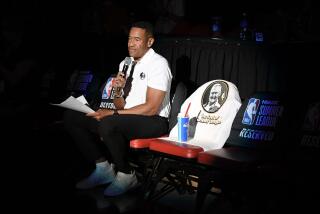Club Officials Say They Are Confident He Can Do the Job--But How Do They Know? : Lester, Lakers’ Quiet Man, Sits Quietly on the Bench
- Share via
The silence is deafening for Ronnie Lester, the quietest Laker who is also experiencing a very quiet season.
“Ronnie’s so quiet, he’s one of those people you sometimes don’t even know he’s around,” said Jerry West, the Laker general manager.
Maybe that’s why Lester has played so little this season. Coach Pat Riley has simply forgotten about him. That would seem perfectly understandable because Lester is hardly your typical, bubbly point guard.
“R. L.’s a little crazier than you might think,” said Michael Cooper, himself a talkative point guard. “He just watches and listens and checks you out. He doesn’t break the mold of the crazy point guard, but he does crack it a little bit.”
Point guards are usually glib, like Magic Johnson or the Celtics’ Dennis Johnson. They play a lot and have a lot to say. But why talk when you can communicate by shaking your head? This is Ronnie Lester, a man of few words and fewer minutes of playing time.
But Riley said he certainly has not forgotten about Lester, sitting down there at the end of the Laker bench. In fact, Riley surprisingly said that if anything happened to Johnson, he wouldn’t hesitate using Lester in the starting lineup.
“He can play at the drop of a pin,” Riley said. “I’d jump Ronnie right up there as a starter. Of course, if something happened to Magic, it wouldn’t make any difference who you got to replace him.”
It’s been a long time since Lester has made a difference on a team, partly because of injuries, partly because of his old situation and partly because of his current one. But never because of his quiet personality.
“I think he has a lot of inner thoughts,” Riley said.
Lester, in his time as a Laker, had plenty of time to come up with some.
The Chicago Bulls put him on waivers Nov. 16, and the Lakers signed him two weeks later. He has since played in 20 of the Lakers’ 45 games.
Saturday night at Dallas, Lester played eight minutes, which may not seem like much. Still, it was the first time he had gotten into a game since Feb. 19, when he played all of one minute against his former club, the Bulls.
“I’m sure it’s difficult to find time for me the way the team has been playing,” Lester said. “It’s been a long year, but not playing here and not playing in Chicago are two different things.”
After four years--and four coaches--in Chicago, Lester became a victim of numbers, according to West. To understand that phrase, you have to speak the language of the NBA.
It means that Lester didn’t have a guaranteed contract.
Lester made $229,000 last season and would have earned $244,000 this season if the Bulls had kept him.
But Coach Kevin Loughery brought free-agent point guard Wes Matthews into camp and signed him to a $65,000-contract, the league minimum, while Lester was out with a sprained ankle.
So Lester was both high-priced and expendable. West signed Lester, also for the $65,000 minimum, and brought him to the Lakers as insurance just in case something happened to Johnson.
The Lakers had Lester’s knee examined before they signed him.
“We tried to protect ourselves,” West said.
When he was a college star at Iowa, not many could have expected Lester to be only a backcourt insurance policy in the NBA.
Lester averaged 19.9 points as a sophomore and 18.7 as a junior, but then his career took a sudden turn for the worse at the very moment his right knee did the same thing. Lester felt his knee buckle during a Christmas tournament as a senior at Iowa in 1979.
Doctors put a cast on the knee, but when Lester tried to play, he hurt it again. He had arthroscopic surgery, and some small pieces of torn cartilage were removed. Lester returned to the team, but he was hurting.
“I knew my knee wasn’t right,” he said.
Just before the draft, Lester had another arthroscopic examination of his knee, which showed no further damage. Portland drafted Lester No. 1, the 10th player chosen in 1980, and traded him and a 1981 first-round pick to the Bulls for the draft rights to Kelvin Ransey.
But Lester’s knee didn’t improve. He was unable to practice during two-a-days, and two weeks into the season, “I was dragging my leg around real bad,” Lester said.
Doctors did an arthrogram on Lester’s right knee, a procedure in which dye is injected into the joint, which is then X-rayed from various angles. They found more torn cartilage and operated again to remove it.
Lester played in only eight games as a rookie, but when his second season came around, he felt ready.
Jerry Sloan, who was the coach at Chicago then and the man who wanted Lester in the first place, brought him along slowly. Lester finished the season with an 11.6-point scoring average in 75 games. Sloan, however, did not finish the season.
“I played pretty well, but the team didn’t play very well and Sloan got fired,” Lester said.
Rod Thorn, now the Bulls’ general manager, took over for Thorn, then brought in ex-Laker Coach Paul Westhead. Loughery replaced Westhead.
“It was real difficult, not only for me, but for all of us,” Lester said. “They’d bring in a new coach year after year.
“Then last year, I got a big shock,” he said. “I wasn’t playing and no one told me why. That really jolted me. But it also might have helped me because it prepared me for not playing this year.”
After this season, Lester will be a free agent. He is going to have company. Kurt Rambis, Mike McGee and Bob McAdoo are all going to be in the same situation.
West said that the Lakers would like to sign Lester again.
“He’s done what we’ve expected of him,” West said. “If you are in our place, go out there on through the draft, and see if you can find a player better than him.”
A healthy Ronnie Lester can do a lot of things when he has the ball. The Lakers know that and believe that before the playoffs are over, he might even influence a game or two.
Lester’s strength is his ability to move the ball upcourt, drive the middle of the defense and then pass off.
According to Riley, the knee injury might have improved Lester’s game by bringing him under greater control. Riley’s only problems with Lester are the lingering effects of the knee problem on Lester’s mobility and the limited playing time Lester can be given.
“Sometimes we have a little too many quality people at his position,” Riley said. “With five guards, three guys are going to have to sit. Maybe Ronnie’s not as good as he was, but for a backup point guard, he’s ideal.
“He’s been a starter before and he keeps himself in super condition, for playing as little as he does,” Riley said. “If I could find some time for him, I’d play him. He understands the situation here.”
Lester said he was ready for his role with the Lakers because he knew what kind of players were here.
“It’s a lot easier sitting because I can see the talent around me and the team’s winning,” he said. “I knew I wouldn’t play a lot.
“It’s still a tough situation because I still think I can play in this league. There are a lot of guys like me. I want to play more and that’s only natural. I hope nothing happens to anybody on our team, but I think I can play well if I get some more minutes.”
Some of the Lakers like to kid Lester about his being so soft-spoken. Cooper whispers Lester’s name when he wants to talk to him.
Lester, however, said he only tries to be what he is, whether he’s the 11th player on the roster, the fifth guard with a history of a bad knee, or the quiet man on the Lakers.
“It takes me time to warm up to people,” Lester said. “I’m pretty laid-back. I don’t say a whole lot, I know, but that’s been me for a long time.”
More to Read
All things Lakers, all the time.
Get all the Lakers news you need in Dan Woike's weekly newsletter.
You may occasionally receive promotional content from the Los Angeles Times.







